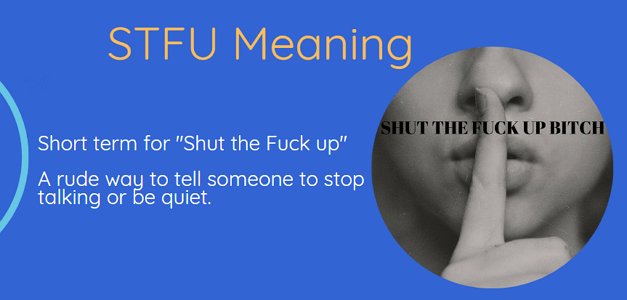What Does STFU Mean?STFU Meaning, Use Cases & More
This controversial phrase has a history and a purpose, and it's not just for shock value. STFU is a common abbreviation frequently used online and in text messages by virtually anyone. Knowing STFU's meaning is as important as knowing any other acronym's meaning. The phrase is most commonly used to demand someone to stop speaking or writing because the speaker finds the other person's words annoying, inappropriate, or offensive.
It is often used as a form of aggressive expression in response to another person's statement or behavior. As a result, "STFU" is generally considered an impolite and offensive phrase and should be used with caution.

And so, in this article, we'll answer the question, 'what does STFU mean?' as well as discuss the origins of STFU. So grab your virtual popcorn and get ready to learn about the mysterious and potentially offensive world of STFU.
1What Does STFU Mean?
So, have you ever wanted to tell someone to shut up most bluntly and rudely possible? Well, "STFU" is a short term that stands for "Shut the Fuck up". It is a rude way to tell someone to stop talking or be quiet. It is generally considered to be a very nasty and inappropriate thing to say, especially in formal or polite settings.

This impolite command has a long history, with roots dating back to the early 20th century in the United States. While it's unclear exactly when or how it came about, one thing is certain: "STFU" packs a punch when telling someone to be quiet.
So next time you're fed up with someone's nonstop chatter, consider dropping an "STFU" their way. Just be prepared for the consequences – this isn't a polite phrase to use in most social situations!"
2How Is the STFU Phrase Used?
The phrase "STFU" is typically used in spoken language, often to interrupt or dismiss someone speaking. It is often used in a confrontational or aggressive way. It is intended to show that the speaker wants the other person to stop talking.
Here are a few ways how the phrase might be used.
In an Argument or Disagreement
In an argument or disagreement, the phrase "STFU" might be used to try to shut down the other person's perspective or dismiss what they are saying. It is often used in a confrontational or aggressive way to convey that the speaker does not want to hear what the other person has to say.
For example, if two people disagree about a particular topic and one person says:
"STFU, I'm trying to watch the movie,"
they are telling the other person to be quiet and stop talking about the issue. This kind of language is not productive and can escalate the disagreement rather than resolve it.
Another good example here is:
"I can't believe you're trying to defend that jerk! STFU already!"
To Interrupt or Dismiss Someone
The phrase "STFU" is often used as a way to interrupt or dismiss someone who is speaking. It isn't polite to tell someone to be quiet or stop talking. It is generally considered very inappropriate and offensive.
For example, if someone is speaking and another person says "STFU," they are telling the other person to stop talking and be quiet. This kind of language is not respectful and can be hurtful, especially if used repeatedly or in a confrontational or aggressive manner.
Here are a few examples of how the phrase "STFU" might be used to interrupt or dismiss someone:
- "STFU, I'm trying to watch the movie." (Telling the other person to be quiet because you want to watch a movie.)
- "STFU, I'm not interested in what you have to say." (Telling the other person to stop talking since you are not interested in hearing their perspective.)
- "STFU, I can't believe you're still talking about this." (Telling the other person to be quiet because you think the conversation has gone on long enough.)
In a Sarcastic or Mocking Way
STFU can also be used sarcastically or mockingly to mock or ridicule someone speaking. It is often used to show that the speaker does not take the other person seriously or does not agree with what they are saying.
For example, suppose someone is talking about an idea the other person thinks is ridiculous. In that case, they might say, "Oh, great idea. STFU and let me think for a minute." It is meant to be sarcastic and to mock the other person's idea.
Other good examples of these scenarios are:
- "Wow, your opinion is so valuable. STFU, and let me hear what the experts have to say." (mocking the other person's opinion.)
- "Gee, I can't wait to hear more of your brilliant insights. STFU already." (mocking the other person's insights and telling them to be quiet.)
3What Is STFU's Origin?
As noted, "STFU" is an abbreviation for "shut the fuck up." It is an impolite expression that tells someone to stop talking, often forcefully or angrily.
The origin of this expression is unclear, but it is likely derived from a combination of the phrase "shut up," which has been used for centuries to tell someone to be quiet. The intensifier "fuck," is often used to emphasize a statement or command.
Some sources believe it originated in the early 1990s as an expression of frustration. In contrast, others believe its origins were in the early 2000s.
4Who Can Use the STFU Phrase?
Have you ever been in a situation where someone wouldn't stop talking, and you just wanted to shout "STFU"? While this phrase may be tempting to use, it's important to remember that it's generally considered rude and offensive.
Generally, the STFU phrase can be used by anyone, but it is generally considered rude and offensive. For this reason, we should only use it in extreme situations where other options have been exhausted, and all other attempts to resolve the issue have failed.
5How Can You Determine If Your Teen Is Using the Phrase STFU?
If you're concerned that your child may be using the STFU phrase, there are a few things you can do to try to determine if this is the case:
1Talk to Your Child
Have a conversation with your child and ask them if they have heard of the phrase or if they have used it themselves. Be open and non-judgmental, and create a safe space for your child to share their thoughts and feelings.

2Observe Your Child's Behavior
Pay attention to how your child communicates with others in person and online. Notice any disrespectful or aggressive language. It could signify that your child is using the STFU phrase or similar language.
3Check Their Social Media Accounts
If your child uses social media, it's worth looking at their accounts to see if they use inappropriate language. Keep in mind that social media is often a place where people feel more comfortable expressing themselves. Hence, your child may be more likely to use the STFU phrase online.
4Track Your Child's Messages
It is, in fact, the ideal solution since it will help you keep track of all communication your kids have. Below are why this option is the best and what parental control app to choose.
Some potential reasons why someone might choose to use the AirDroid Parental Monitoring App for tracking their child's conversations could include the following:
- Allow you to monitor your child's text and instant messages in real time, which can help ensure their safety and well-being.
- The app provides real-time sync when notifications are received on the child's device, which can help you identify potentially concerning or inappropriate content.
- The app allows you to remotely view the live screen of the child's Android device, which can help you get a better understanding of their online activities and interactions.

The app provides a range of features and options for customizing the level of monitoring and controls you have over your child's messaging activities, such as:
- Remote monitoring of all activities
- Keeping track of your child's location
- Sync App Notifications
- App & Screen Time Management
6Final thoughts
In conclusion, "STFU" is a blunt and impolite way of telling someone to be quiet or stop talking. Its origins can be traced back to the early 20th century in the United States. However, the detailed history of the phrase is unclear.
While it may not be appropriate to use "STFU" in all social situations, it can effectively convey your message when you're fed up with someone talking. Just be prepared for the potential consequences of using such a rude phrase.
And so, if you are a parent looking to stop your kid from using such phrases, you can use the parental control app to track their conversation.












Leave a Reply.